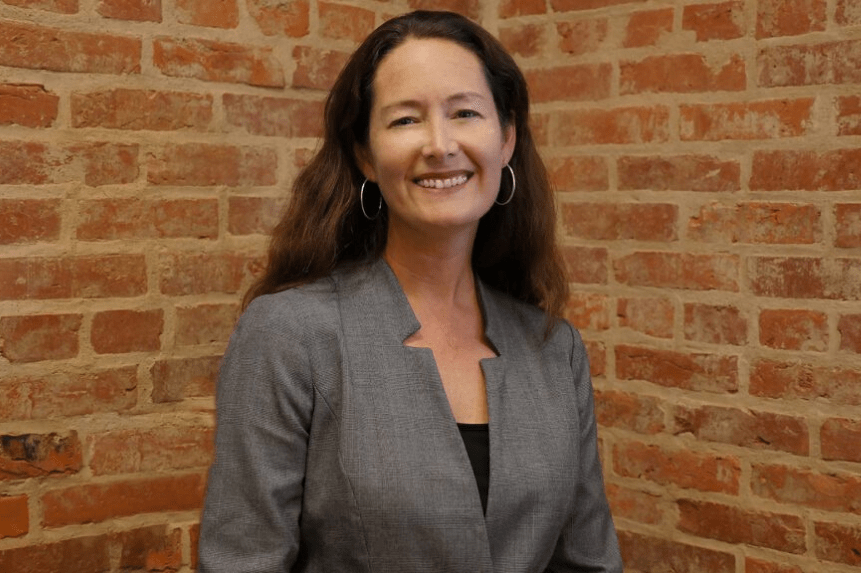by Sheri Flanigan- Vazquez, Chief Operating Officer of Justine PETERSEN and advisor of Inclusive Growth in St. Louis event series.
I am educated as a Master of Social Work, but perhaps assume the role of a banker by profession. Are they mutually exclusive? Does this pose an inherent paradox? And if so, why I am attracted to the virtue of inclusive growth?
Answers to all three questions can be found in the daily work of personifying the mission of Justine PETERSEN, the non-profit financial asset-building organization that I’ve helped (and watched) grow over the past 20 plus years.
Furthering the legacy of Justine M. Petersen, we combine the fundamentals of clinical social work with the tenets of banking and finance by counseling, guiding and advising individuals and families along the path of financial asset-building. Our ultimate goal is to support homeownership and small business creation and expansion.
At Justine PETERSEN, we “put a face on every transaction,” by wedding technology with the human element. We listen first. The individual or family’s needs must be heard first and foremost, with an analytical response that is grounded in financial soundness, yet palatable within an emotional context to foster the relationship necessary for continued success.
But what does this have to do with inclusive growth? Everything. There is no inclusive growth without an inclusive economy. Every resident, every small business owner, every community member must have access to:
- Safe and affordable capital
- Mainstream financial products, services and relationships
- Marketplace and constituencies across divides
Let’s take a closer look at each:
Safe and Affordable Capital
Justine PETERSEN is one of the nation’s leading microlenders for the U.S. Small Business Administration. We have deployed millions of dollars to thousands of small businesses unable to access capital from a mainstream lender. Moreover, as a Community Development Financial Institution (CDFI), we re-deploy capital investments from banks, philanthropy and private wealth to not only small businesses in need, but also to individuals seeking an alternative to predatory consumer lenders, namely payday and online lending platforms.
As a HUD-certified housing counseling agency, we ensure that first-time homeowners have access to a competitively-priced home mortgage from a mainstream lender, ensuring that the home purchase leads to a lifetime of equity-building.
An inclusive growth strategy without access to safe and affordable capital would be short-sighted and ultimately unsustainable. Far too often, such endeavors lack this most essential capital piece.
Mainstream financial products, services and relationships
At Justine PETERSEN, we provide a “port of entry” to mainstream finance, equipping individuals, families and small businesses with the initial financial products and services that ultimately opens doors – both literally and figuratively – with mainstream service providers, namely banks and credit unions.
The notion of “graduating” to mainstream financial products and services is a “high-touch” ongoing process, which is heavily reliant upon creating an environment of trust and security.
Central to trust-building, is of course, the seeding and cultivation of financial relationships that transcend the walls of Justine PETERSEN, and allow our client base the opportunity to reap the benefits of mainstream financial counsel writ large.
A true inclusive growth strategy would be inclusive in and of itself. It must include a spectrum of choice as it relates to mainstream financial products, services and relationships.
Marketplace and constituencies across divides
Our most notable physical divide in St. Louis is, of course, Delmar Boulevard, separating our greater community both physically and spiritually. The “Delmar Divide” is our Berlin Wall for inclusive growth, and we must as a region unite to not only dismantle it but replace its memory with a vision that promises the fruits of tomorrow for all to share.
Sadly, Delmar Boulevard is not our only divide. We have other divides, be they political or cultural, and their aggregate results in further widening of the racial equity gap, and further distancing from a trajectory of comprehensive inclusive growth.
All community members and small businesses need access to all markets and to all constituencies. An inclusive growth strategy is incumbent upon a non-fragmented community, both in principle and practice.
I am honored and humbled to serve on the Inclusive Growth in St. Louis advisory board. And I welcome any and all to engage with this noble effort.
We’re in this together. Each and every one of us.
What does inclusive Growth in St. Louis mean to you?
Inclusive growth in St. Louis should not be a set goal, but rather a kinetic process that is forever evolving. This process should be multi-faceted, with new facets ever emerging, and with that, new participants and publics coming into play. More specifically, inclusive growth necessitates representation from all, for the benefit of all. For such representation to be realized, inclusive growth must be embraced as community virtue, where collaborative synergy among and across every divide be sought and harnessed.
About Sheri Flanigan-Vazquez

Sheri Flanigan-Vazquez, MSW, is the Chief Operating Officer of Justine PETERSEN where she joined the staff in 1998. She was instrumental in the planning and implementation of Justine PETERSEN’s Individual Development Account Program and U.S. Small Business Administration Micro-Loan Intermediary Program. She is also a founder of Great Rivers Community Capital. GRCC is a Community Development Financial Institution (CDFI), a lending organization wholly owned by Justine PETERSEN. Sheri has a Master of Social Work from the Brown School at Washington University in St. Louis and a Bachelor of Arts from Knox College in Galesburg, IL. She was a founding board member of Choices Federal Credit Union, a former member of the Community Advisory Board of IFF, and is a current member of the Community Advisory Board of Midwest Renewable Capital. Sheri is married to Jesus Vazquez and has two children, Claudia and Gabriela.
One Comment
Comments are closed.